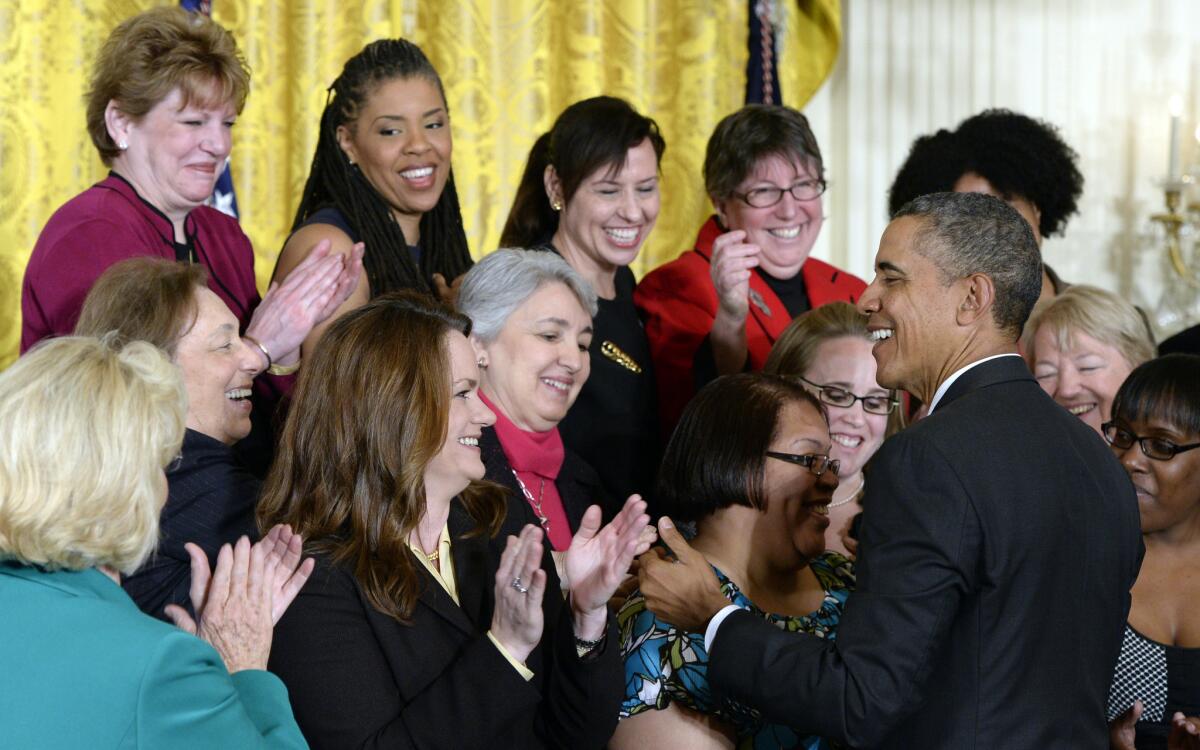White House stops plan for companies to report worker pay by race and gender

- Share via
The White House has halted an Obama administration rule that would require businesses to report worker pay data by gender, race and ethnic groups in hopes of narrowing wage gaps among workers.
The plan was announced by President Obama in early 2016 and was set to take effect early next year.
But the Trump administration, siding with the U.S. Chamber of Commerce and others, contended that the data collection would be too burdensome for firms and questioned how effective the information might be in fighting wage discrimination.
Critics of the White House move, which came in a memo from the Office of Management and Budget on Tuesday, were outraged.
“Make no mistake — it’s an all-out attack on equal pay,” Fatima Goss Graves, president of the National Women’s Law Center, said in a statement. “Today’s action sends a clear message to employers: If you want to ignore pay inequities and sweep them under the rug, this administration has your back.”
The plan would have expanded a 2014 executive order that the Labor Department collect wage data by gender, race and ethnicity from federal contractors.
The Equal Employment Opportunity Commission had proposed that all employers with at least 100 workers submit the data across 10 job categories and 12 pay ranges on a form they already are required to submit annually that includes employment data by gender, race and ethnicity.
Specific salaries would not be reported and the data would not be made public. The EEOC said it would analyze the information to better focus investigations into unlawful pay practices.
But Neomi Rao, administrator of the OMB’s Office of Information and Regulatory Affairs, sent a memo to EEOC Acting Chair Victoria Lipnic saying the Office of Management and Budget was “initiating a review and immediate stay” of the new plan.
“Among other things, OMB is concerned that some aspects of the revised collection of information lack practical utility, are unnecessarily burdensome and do not adequately address privacy and confidentiality issues.”
The ruling “will not alter EEOC’s enforcement efforts,” Lipnic said in a statement. “The EEOC remains committed to strong enforcement of our federal equal pay laws.”
Randy Johnson, a senior vice president for the U.S. Chamber of Commerce, said the chamber was “gratified” by the White House decision in part because the chamber estimated that it would cost employers $1.3 billion a year.
“This is a common-sense decision,” Johnson said in a statement.
Ivanka Trump, the president’s daughter and unpaid assistant, also issued a statement defending the decision.
“Ultimately, while I believe the intention was good and agree that pay transparency is important, the proposed policy would not yield the intended results,” she said.
But Debra Ness, president of the National Partnership for Women & Families, said halting the data-collection plan was “a blatant attack by the Trump Administration on fair pay for women and people of color.”
She said in a statement that the move “belies the administration’s claim, made just last weekend, that it supports women’s equality and economic opportunity.”
Twitter: @PeltzLATimes
More to Read
Inside the business of entertainment
The Wide Shot brings you news, analysis and insights on everything from streaming wars to production — and what it all means for the future.
You may occasionally receive promotional content from the Los Angeles Times.











